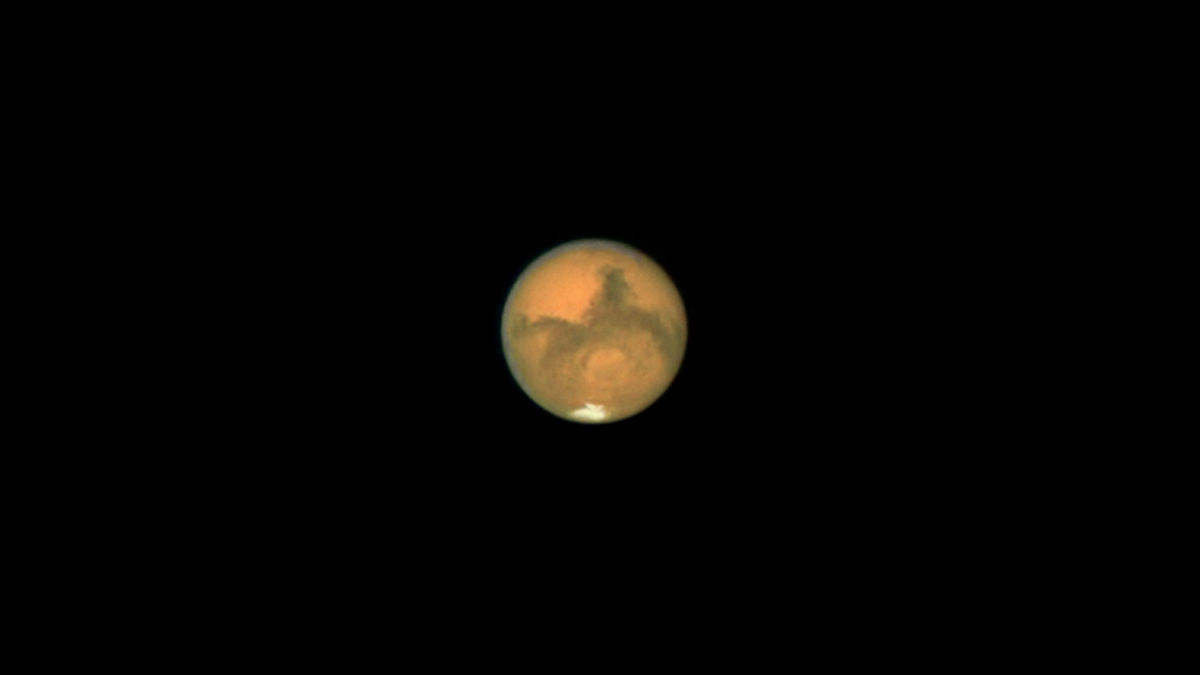Mars to pass closest to Earth in 11 years
Red Planet will be visible with the naked eye while binoculars or telescopes will show its amazing terrain

A free daily email with the biggest news stories of the day – and the best features from TheWeek.com
You are now subscribed
Your newsletter sign-up was successful
Mars will reach its closest point to Earth in 11 years later this month, sending stargazers dusting off the lenses of their telescopes and binoculars in the hope of catching a rare close-up.
The Red Planet's elliptical orbit means it will be a mere 47.2 million miles away on 30 May and will remain close and bright for the first two weeks of June. At this distance, some of the planet’s terrain will be visible with even the most basic equipment.
The planet’s brightness will also be exacerbated by a phenomenon known as “Mars opposition”, which occurs when Mars and the Sun line up on directly opposite sides of the Earth, The Independent reports.
The Week
Escape your echo chamber. Get the facts behind the news, plus analysis from multiple perspectives.

Sign up for The Week's Free Newsletters
From our morning news briefing to a weekly Good News Newsletter, get the best of The Week delivered directly to your inbox.
From our morning news briefing to a weekly Good News Newsletter, get the best of The Week delivered directly to your inbox.
Robin Scagell, the vice president of the UK’s Society for Popular Astronomy, told Sky News: “I observed [Mars] through quite a small five-inch reflecting telescope at the beginning of the month and could see a surprising amount of detail.”
If the skies are clear, the planet will be visible without the need for a telescope or binoculars for much of the night.
Meanwhile, Nasa, whose Hubble telescope has trained its lens on Mars this month, has released some stunning images showing what appear to be clouds and visible snow-covered polar ice caps on the planet. There are likely to be more photos released as the proximity between Earth and Mars is reduced.
The closest distance between the two planets was recorded in August 2003, when they were 35 million miles apart. When Mars is at its furthest, the distance can be as great as 250 million miles.
A free daily email with the biggest news stories of the day – and the best features from TheWeek.com
The planet will be visible right before midnight, when it will appear in the south-east corner of the sky, preceded by a pale-blue Saturn and the Moon.
-
 What to know before filing your own taxes for the first time
What to know before filing your own taxes for the first timethe explainer Tackle this financial milestone with confidence
-
 The biggest box office flops of the 21st century
The biggest box office flops of the 21st centuryin depth Unnecessary remakes and turgid, expensive CGI-fests highlight this list of these most notorious box-office losers
-
 What are the best investments for beginners?
What are the best investments for beginners?The Explainer Stocks and ETFs and bonds, oh my
-
 Epstein files topple law CEO, roil UK government
Epstein files topple law CEO, roil UK governmentSpeed Read Peter Mandelson, Britain’s former ambassador to the US, is caught up in the scandal
-
 Iran and US prepare to meet after skirmishes
Iran and US prepare to meet after skirmishesSpeed Read The incident comes amid heightened tensions in the Middle East
-
 Israel retrieves final hostage’s body from Gaza
Israel retrieves final hostage’s body from GazaSpeed Read The 24-year-old police officer was killed during the initial Hamas attack
-
 China’s Xi targets top general in growing purge
China’s Xi targets top general in growing purgeSpeed Read Zhang Youxia is being investigated over ‘grave violations’ of the law
-
 Panama and Canada are negotiating over a crucial copper mine
Panama and Canada are negotiating over a crucial copper mineIn the Spotlight Panama is set to make a final decision on the mine this summer
-
 Why Greenland’s natural resources are nearly impossible to mine
Why Greenland’s natural resources are nearly impossible to mineThe Explainer The country’s natural landscape makes the task extremely difficult
-
 Iran cuts internet as protests escalate
Iran cuts internet as protests escalateSpeed Reada Government buildings across the country have been set on fire
-
 US nabs ‘shadow’ tanker claimed by Russia
US nabs ‘shadow’ tanker claimed by RussiaSpeed Read The ship was one of two vessels seized by the US military